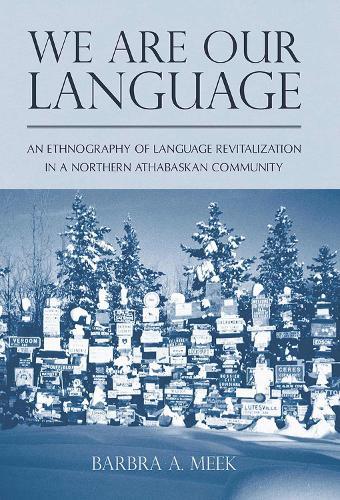Overview
For many communities around the world, the revitalization or at least the preservation of an indigenous language is a pressing concern. Understanding the issue involves far more than compiling simple usage statistics or documenting the grammar of a tongue--it requires examining the social practices and philosophies that affect indigenous language survival. In presenting the case of Kaska, an endangered language in an Athabascan community in the Yukon, Barbra Meek asserts that language revitalization requires more than just linguistic rehabilitation; it demands a social transformation. The process must mend rips and tears in the social fabric of the language community that result from an enduring colonial history focused on termination. These 'disjunctures' include government policies conflicting with community goals, widely varying teaching methods and generational viewpoints, and even clashing ideologies within the language community. This book provides a detailed investigation of language revitalization based on more than two years of active participation in local language renewal efforts. Each chapter focuses on a different dimension, such as spelling and expertise, conversation and social status, family practices, and bureaucratic involvement in local language choices. Each situation illustrates the balance between the desire for linguistic continuity and the reality of disruption. We Are Our Language reveals the subtle ways in which different conceptions and practices--historical, material, and interactional--can variably affect the state of an indigenous language, and it offers a critical step toward redefining success and achieving revitalization.
Full Product Details
Author: Barbra A. Meek
Publisher: University of Arizona Press
Imprint: University of Arizona Press
Dimensions:
Width: 14.90cm
, Height: 1.70cm
, Length: 22.60cm
Weight: 0.369kg
ISBN: 9780816514533
ISBN 10: 0816514534
Pages: 232
Publication Date: 01 February 2012
Audience:
College/higher education
,
Professional and scholarly
,
Tertiary & Higher Education
,
Professional & Vocational
Format: Paperback
Publisher's Status: Active
Availability: Manufactured on demand

We will order this item for you from a manufactured on demand supplier.
Reviews
<p> A scholarly but personal reflection on language issues faced by the Kaska community in British Columbia. The author, Barbara Meek, uses language renewal efforts as a lens through which she pulls into focus the language challenges the community faces as well as some of the reasons those challenges exist. [Meek] also presents ideas for how to move forward. -- Spoken First
A scholarly but personal reflection on language issues faced by the Kaska community in British Columbia. The author, Barbara A. Meek, uses language renewal efforts as a lens through which she pulls into focus the language challenges the community faces as well as some of the reasons those challenges exist. [Meek] also presents ideas for how to move forward. --Spoken First This is an important book. Anyone involved in language revitalization would gain a lot by reading it. Original, informative, and well written. --Leanne Hinton, co-author of How to Keep Your Language Alive: A Commonsense Approach to One-on-One Language Learning
<p> A scholarly but personal reflection on language issues faced by the Kaska community in British Columbia. The author, Barbara Meek, uses language renewal efforts as a lens through which she pulls into focus the language challenges the community faces as well as some of the reasons those challenges exist. [Meek also presents ideas for how to move forward. -- Spoken First
A scholarly but personal reflection on language issues faced by the Kaska community in British Columbia. The author, Barbara Meek, uses language renewal efforts as a lens through which she pulls into focus the language challenges the community faces as well as some of the reasons those challenges exist. [Meek] also presents ideas for how to move forward. Spoken First
Author Information
Barbra A. Meek is an associate professor of anthropology and linguistics at the University of Michigan. In addition to conducting her research, she has helped organize and produce Kaska language workshops and teaching materials.




